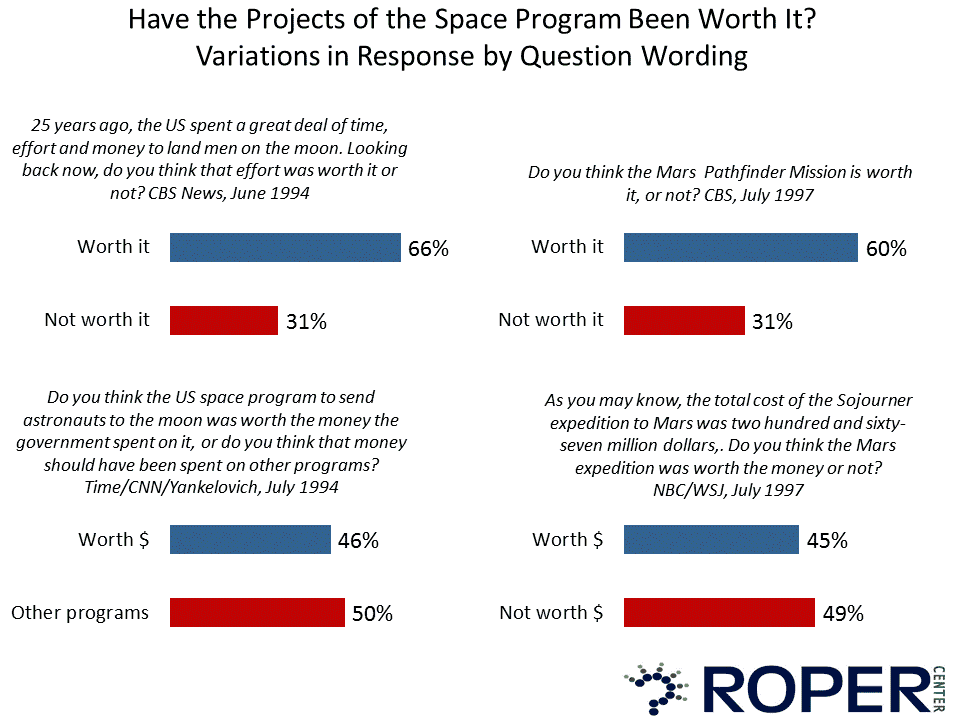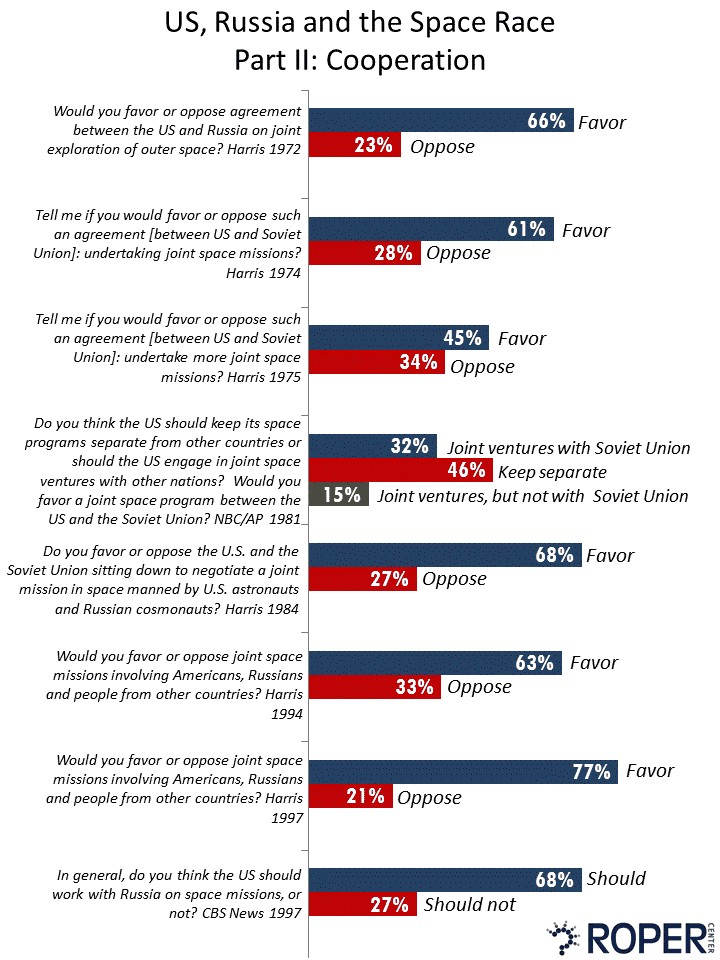On March 3, 1915, the U.S. government established the National Advisory Committee for Aeronautics, or NACA. In 1958, NACA became NASA. In polls in the years since, the American public has shown pride in the country’s accomplishments in space exploration, along with concern about the costs involved.
A review of public attitudes about the space program, from the Roper Center for Public Opinion Research archives:
Satellite of love (mostly)
There’s no question that Americans take pride in the country’s space ventures. When asked to say in their own words what America’s greatest achievement was in the 20th century, 17% of respondents in a 2006 Research!America poll said the space program, the highest percentage of all answers. The public also recognizes the importance of specific accomplishments, like the landing of the Mars rover, seen as a major achievement by 72% of the public in a 2012 CNN/ORC poll.
But the public was not so certain about the value of the space program in its early days. In a 1967 Harris poll, 54% said the $4 billion price tag on putting a man on the moon and exploring other planets wasn’t worth it; only a third thought it was. Fifty-seven percent in a 1965 Harris poll thought this money would be better spent on developing systems for the desalinization of water. The public in 1967 was split on the specific key goal of landing a man on the moon: 46% in the Harris poll opposed the project, and 43% supported it.
Support for spending on the space program was low during the recession years of the 1970's, but increased in the eighties, possibly spurred by Reagan’s interest in the potential national defense capabilities in space, and never hit such lows again. Currently, a majority say the country spends too little or about the right amount.

Opinions about the moon landing also changed by the eighties, with majorities since then seeing the signature accomplishment of the early space program as worth the cost and effort. Similarly, most Americans believed the space shuttle program to have been worth the investment. Setbacks that might have been expected to sour public attitudes appear to have had no such effect: the proportion saying that the space shuttle program was worth it reached peaks immediately following both the Challenger and Columbia disasters.

But how much does it cost, exactly?
Specific reminders of the costs and economic trade-offs of space exploration elicit lower levels of approval, particularly when the price tag is linked to specific missions. In 1996, even the otherwise popular lunar missions were supported by less than half the country when they were reminded that the money might have been spent on other programs.

In general, the public likes manned space missions. In a 2014 Pew poll, 59% said manned programs are essential to the future of the space program. In a 2003 Gallup/CNN/USA Today poll, 52% said NASA should focus on manned space programs like the space shuttle, while just 37% thought the focus should be on unmanned missions.
However, reminders of costs can outweigh the public’s fondness for putting people in space. For example, when asked in 1996 if they supported a manned mission to Mars, without any mention of costs, 67% favored. But when asked if they preferred relatively inexpensive unmanned missions to Mars or significantly more expensive manned missions, 68% of respondents in a 1997 Time/CNN/Yankelovich survey preferred the budget option.
Astronauts and cosmonauts
Between Sputnik and Yuri Gagarin, Americans of the 1950's and 1960's had good reason to see the Russian space program as more advanced than that of the States. Competition with the Russians clearly built initial support for the space program. Sixty percent of Americans in a 1967 Harris poll said that if the Russians were not in space, they would oppose continuing the space program at the current rate. Most did not, however, see the specific goal of being the first country to land a man on the moon as particularly important. Concerns about Russian technical superiority re-emerged in the 1980's, along with, not coincidentally, support for increased NASA spending. In a 1981 Harris poll, 68% said that developing a military capacity in space beyond that of the Russians was a very important use of the space shuttle.

However important competition may have been to creating support for the space program, cooperation with the Soviets has been valued by Americans in poll after poll since the 1970's. One exception came, again, in the early eighties, at a time when 41% of Americans in an ABC/Washington Post poll said the Soviets were ahead of the U.S. militarily. In a 1981 NBC News/AP poll, a majority wanted the US space program to be kept separate from that of the Soviet Union. But only three years later, a strong majority told Harris they favored negotiations to develop a joint US/Soviet mission. A 2011 CNN/ORC poll found only 38% of the country believing it was very important to be ahead of Russia and other countries in space exploration. The question remains whether this decrease in competitive drive, combined with an increase in cooperative missions and ongoing concerns about costs, will ultimately lower support for NASA spending.

Roper Center data. Collections cited include Research!America 2006, Harris 1965, 1967, 1972, 1974, 1975, 1981, 1984, 1997; Roper 1971-1986; NORC 1973-2013; CBS News 1979-2005; ABC News 2009; Time/CNN/Yankelovich 1994, 1997; NBC News/WSJ 1997; Pew 2014; Gallup/CNN/USA Today 2003; Gallup, 1959-1967; AP/Media General 1968; ABC News/Washington Post 1981; NBC News/AP 1981; CNN/ORC 2011;
Date Published: March 10, 2015